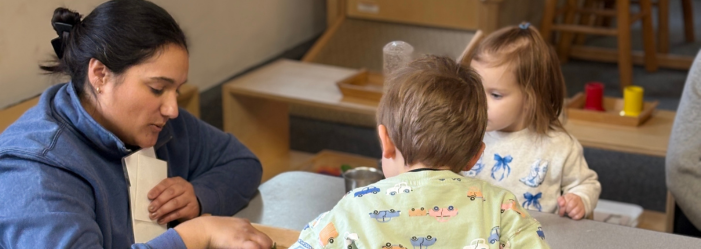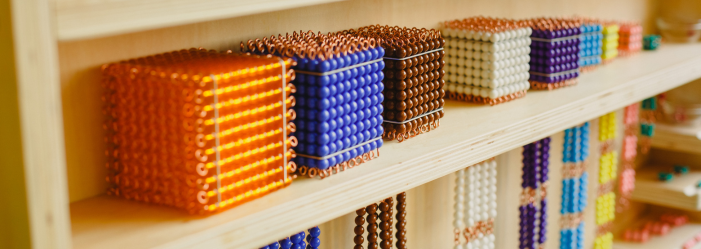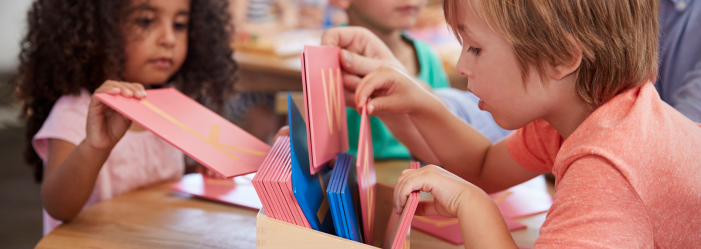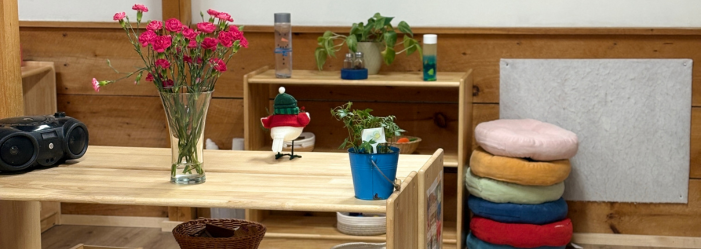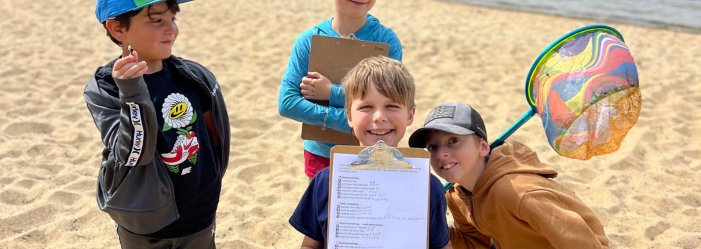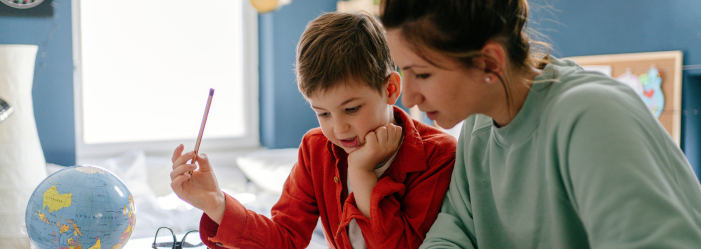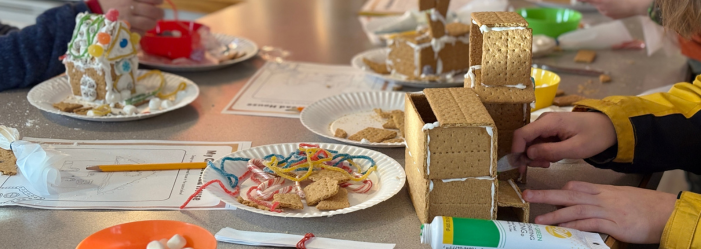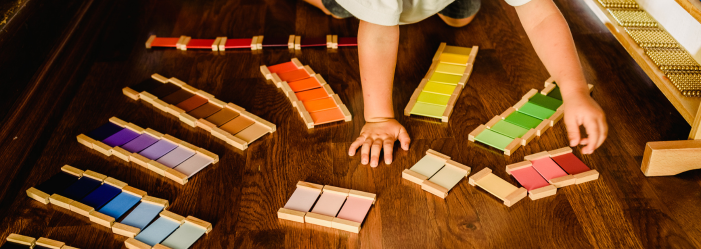What to Say Instead of “Good Job” to Kids
What to Say Instead of “Good Job” to Kids

Every parent wants to build their child’s confidence and help them feel proud, capable, and seen. Praise often feels like the fastest way to do that. Have you ever noticed how quickly the phrase “good job” loses its power when we say it a dozen times a day? Have you ever thought about what to say instead of good job? At Sandwich Montessori School, we believe every interaction is an opportunity to nurture independence and inner strength.
It’s not that praise is bad, it’s that vague praise misses an opportunity. Our words can either help children internalize confidence or teach them to chase approval. The trick lies in making praise specific, thoughtful, and reflective. When we choose our words intentionally, we help children see their own courage, kindness, and persistence reflected back to them.
In Montessori classrooms, we use language carefully because words shape how children see themselves. The goal isn’t to make a child work for approval, but to help them see their own effort and progress clearly. In Montessori environments, the adult’s language acts as a mirror, helping the child notice their own growth.
Why Praise Matters
Praise is powerful, it tells children what we value, but when overused or too general, it can teach kids to seek validation instead of developing self-motivation.
“A child’s sense of self grows from doing, not from being told they’re good.” — Dr. Maria Montessori
At Sandwich Montessori School, we honor the child’s work by recognizing effort, concentration, and care . . . qualities that grow confident, kind, and capable humans.
Effects of Praise on Motivation
Research in child psychology supports this: when children are praised for effort, not just outcome, they become more resilient and curious. They’re more likely to take risks, problem-solve, and persevere through challenges. This is exactly what Montessori education seeks to nurture: a child who is intrinsically motivated and finds joy in the process of discovery rather than in external praise and rewards. When children know that their effort is what’s noticed, they become braver learners, ready to face challenges with curiosity
A Story from the Classroom
One afternoon, a teacher watched as a seven-year-old spent nearly half an hour completing a complex pattern puzzle. When she placed the final piece, she looked up expectantly, waiting for that familiar, “Good job!”
Instead, the teacher smiled and said,
“You worked so carefully to find which piece fit. How does it feel to see it finished?”
The child’s expression changed instantly, she wasn’t just proud because the teacher was; she was proud because she recognized her own effort.
That’s the magic of mindful praise. When we draw a child’s attention to what they actually did, the effort, the patience, and the problem-solving, we help them build confidence that doesn’t depend on anyone else noticing.
In Montessori classrooms, the adult observes quietly, offering words that help the child see their own process. This gentle guidance strengthens both independence and self-awareness. Moments like these remind us that true strength grows from within, as children begin to trust their own abilities. Just as a seed grows stronger when it stretches toward the light on its own, a child’s confidence grows most beautifully when it is self-driven.
Why Generic Praise Falls Flat
When we use blanket praise like “good job” or “you’re so smart,” we often mean well, but we accidentally shift the focus away from the learning itself.
Instead of thinking “I worked hard and figured that out,” a child might think “I’m only good when someone tells me so.”
Specific, descriptive feedback does the opposite. It gives children the language to reflect on their own growth to see cause and effect, effort and outcome. Over time, that reflection becomes an internal voice that says, “I can do hard things.”
In Montessori classrooms, this process mirrors self-correction in the learning environment. The child notices, adjusts, and tries again independently, guided not by external praise, but by their own awareness. At Sandwich Montessori School, we know that’s how children grow not only confident and capable, but also kinder with themselves and others.
What to Say Instead of “Good Job”
Here are a few simple swaps that encourage reflection and confidence:
| Situation | Try saying this instead: |
|---|---|
| Your child completes a puzzle | “You worked so patiently to fit all those pieces, how did you know where each one went?” |
| They draw a picture | “You added so many details tel, l me about what’s happening in your picture.” |
| They help clean up | “You noticed the floor needed sweeping and took care of it, that was thoughtful.” |
| They read a new book aloud | “You sounded out every word carefully. That practice really paid off!” |
| They spent time doing something hard | “That took a lot of focus” or “You really stuck with that!” |
| They poured their own water | “I noticed how careful you were.” |
| They watered the classroom plants | “You took care of the plants so gently, they are happy and growing!” |
| They helped a friend zip their coat | “You noticed a friend needed help, that was kind and brave to offer to help.” |
The magic isn’t in the phrase itself, it’s in the specificity. The more you notice what they did, the more your child learns to value their own growth. These phrases of genuine attention tell your child you see them, not just their outcome.
Why Specific Praise Builds Confidence
Specific praise helps children recognize the link between effort and success. When you describe what you see (rather than evaluate it), you help your child make connections.
Eventually, “I worked carefully” leads to the conclusion, “That’s why it turned out well.” Or, “I kept trying,” leads to “That’s why I solved it.”
This kind of feedback strengthens both confidence and responsibility and helps children internalize why something worked. It also invites self-correction. When children know what success looks like, they can recognize it on their own next time. This builds true confidence, the kind rooted in awareness rather than approval.
At Sandwich Montessori School, we see this daily in the classroom from our infants all the way through to our middle school students: a quiet sense of pride when a child pours water without spilling, when they patiently return a work to its place for the next friend, or when they help a younger student through a tough concept. These small acts of care are the foundation of growing kinder, braver, and stronger people.
How to Encourage a Growth Mindset at Home
Every challenge is an opportunity for mastery. Children thrive when they understand that effort, not perfection, is what leads to success.
Here’s how to encourage a growth mindset at home:
- Praise effort, not talent: “You kept working until it made sense,” instead of “You’re so smart.”
- Ask questions that invite reflection: “What was tricky about that?” or “What part made you feel proud?”
- Normalize mistakes: “It didn’t work, yet, what could we try differently?”
When children see struggle as part of the process, they become more resilient, curious, and confident learners. Just as plants stretch toward the light to grow stronger, children flourish when given space, patience, and gentle guidance.
Putting It All Together
Next time you’re tempted to say “good job,” pause for a moment and really notice what your child did. Then describe it.
Your child will start to notice, too, and that awareness builds a foundation of genuine self-esteem that lasts long after the praise fades.
When children are encouraged to reflect on their own effort and progress, they begin to measure success from within. As they build that self-awareness, they start to ask themselves, “What am I proud of? What did I learn?” and that’s the foundation of lifelong motivation.
At Sandwich Montessori School, we use intentional language to nurture independence, confidence, and curiosity and guide each child to grow stronger, kinder, and braver every day.
Ready to learn more?
Explore how Montessori education helps children build inner strength and authentic confidence → Here

